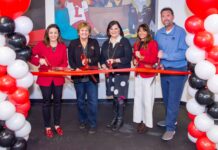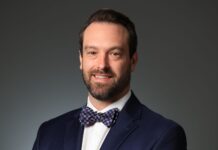
Residents of certain zip codes live fewer years than their neighbors. According to 2020 census data, life expectancy is 65 years for those who live in 40203, for example, about 15 fewer years than the average for residents in other parts of Louisville. This startling statistic, along with the fact that more than 50% of 40203 residents live below the federal poverty line, was the impetus for a new Coalition to Transform Advanced Care (CTAC) initiative in partnership with UofL Trager Institute.
CTAC, who has been working since 2020 to rally faith leaders in this effort, is a Washington, D.C.-based nonprofit whose mission is to be a voice and improve lives for the 12 million people impacted by serious illness, including their families and caregivers.
Effort tackles health care barriers
With CTAC support, the Trager Institute’s Louisville Community of Care Project – Community Health Worker Initiative to Promote Health Equity (LCCP-CHWPHE) was launched earlier this year with funding from the Foundation for a Healthy Kentucky to address health disparities in this vulnerable 40203 zip code.
“LCCP is a collaborative effort of more than 15 community partners assembling their collective resources,” said Barbara Gordon, director of community engagement at the Trager Institute. “The church, major hospitals, and community resources are joining forces for the greater good of the people.”

This pilot program employs a dedicated neighborhood community health worker whose aim is to enhance the quality of life for residents through care navigation and community-based support. LCCP’s goal is to enroll 100 residents into the program by the end of 2025. So far, the initiative has offered health screenings and fairs to offer information and resources for 40203 residents.
Connecting the public to resources
Selected for her new role in June 2024 from her paraprofessional community health worker apprenticeship program at Trager Institute, LCCP coordinator Charlie Bell works as a liaison and advocate to improve access to primary care, support early diagnosis, reduce ER visits and address social determinants of health for clients.
With neighborhood input, factors like food, transportation and housing were identified as the most pressing hurdles to health care access and other quality of life issues. LCCP has gathered health care, business and nonprofit partners who can span the spectrum of social services.
As the point of contact and liaison to connect patients to resources, Bell explained there needs to be more “warm handoffs.”
“We may do a referral through an electronic medical record like MyChart but if it’s someone who doesn’t have an internet connection or doesn’t know how to use the computer, it’s a huge barrier. If we didn’t have the community of care project, then this would never be brought to light.”
Faith leaders fill the trust gap
Historically, one of the biggest challenges for community outreach efforts has been residents’ distrust of health care providers, according to Bell, but leveraging the community’s established relationships with faith leaders is helping to mitigate that factor.
Bell is working with Elder Angela Overton and faith project leads Rev. Dr. Angela Johnson, Rev. Lance West and Pastor Alma Wooley to keep 40203 residents from falling through the cracks of health care and social services access.
Overton, community engagement director for LCCP, and senior advisor and director of Faith Community Partnerships for CTAC said they hand-picked local faith leaders already working beyond the church walls in the local community. “No matter what your religion or if you have a religion, if you are struggling to navigate life with illness or chronic disease, we want to help you.”
The challenge of health inequities
An important overall framework for LCCP identifies stress and health inequities among African Americans, a key demographic of the 40203-zip code. Bell uses this context to address the social determinants of health while working to dismantle structural barriers that perpetuate health disparities.
“We’re still dealing with access to health care issues, mistrust in medical staff and discrimination like we did in the ‘60s and ‘70s,” said Bell. “It’s surprising that these things are still happening in 2025.”
As a strategic planner, Overton works at the intersection of health care, spiritual care and clinical care, and said she has been shocked at the apathy she has seen in some community settings. “The system does not work for everyone, and the disheartening message I hear in boardrooms and executive meetings is that is just how it is,” said Overton. “But this project from the beginning has made profound impacts on this community.” Increasing a neighborhood’s access to health care changes lives, adds Bell.
“What may seem like a simple fix or a few phone calls can change the world for a client. Getting an electric wheelchair to someone who was bedridden for three years changed the mobility for one client. She told me, ‘You saved my life, thank you for saving my life’ – you can’t get any higher than that,” Bell said.
LCCP community partners include:
AARP, Accessia Health, Archangels, CenterWell, Chrysalis Ventures, Gilda’s Club, KIPDA, Norton Healthcare, University of Louisville, University of Louisville Trager Institute.






























